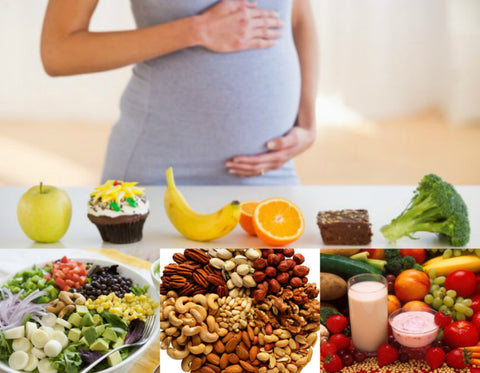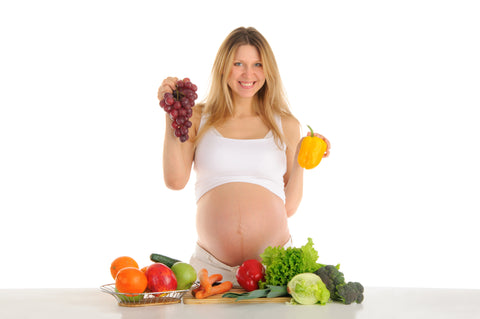Even though pregnancy is one of the most joyful times in a woman's life, it also comes with unique mental and physical challenges. During pregnancy, it is of the utmost importance to consume a nutritious and well-balanced diet, as this will ensure that both the mother and the baby continue to enjoy good health. During this period, your body needs more nutrients to promote your kid's health. During your pregnancy's second and third trimesters, you need to increase your calories by 400 to 500 daily. Poor eating decisions may lead to weight gain and an increased chance of difficulties during childbirth. To ensure that the developing baby receives the optimal amount of each nutrient, pregnant women need to pay close attention to the foods they consume throughout their pregnancies.

Maintaining your and your baby's health throughout pregnancy may be accomplished by selecting nutritious meals. In addition, it makes it simpler for you to reduce your postpartum weight after you have given child. As a result, we have put up a list of the top 10 foods that are safe for you to consume when you are expecting a child.
- Milk and other dairy items: Consumption of dairy products is recommended at a high level during pregnancy. It makes it easier for you to satisfy the increased requirements for proteins and calcium your developing fetus needs to be healthy. To maintain your infant's health, you should eat more Greek yogurt, paneer, and ghee and drink at least one glass of milk daily.
- Eggs: Eggs are often regarded as one of the healthiest foods available due to their abundance of vitamins, minerals, and proteins. Eggs, which contain proteins, benefit a developing child because these proteins help the fetus produce new cells and repair damaged ones. In addition, eggs have a significant quantity of choline, an element necessary for the development of an unborn child's brain and nervous system.
- Water: One of the finest things you can do for yourself and your unborn child while pregnant is to stay hydrated. Hydration not only makes you feel better, but it also helps with morning sickness and nausea. Dehydration, however, may cause contractions and even preterm delivery. In addition to the water found naturally in meals, aim for 10 glasses of fluids every day.
- Sweet potatoes: Beta-carotene, which is turned into vitamin A inside the body and is needed for forming cells and tissues, may be found in extremely high concentrations in sweet potatoes, which are an excellent source of beta-carotene. Additionally, vitamin A may improve one's eyesight and strengthen one's immune system. Therefore, eating more sweet potatoes may be good for the mother and the unborn child.
- Legumes: Peanuts, lentils, chickpeas, beans, peas, and soybeans are all members of the legume food category, which also contains soya beans and peas. They are a fantastic source of plant-based fiber, protein, folate, calcium, and iron, all of which are essential nutrients for a woman who is expecting a child. Your child will be healthy at birth and will have a better chance of avoiding numerous ailments and infections in the future if you consume an adequate amount of folate during pregnancy.
- Nuts: Because of their delectable flavor and high content of beneficial fats, nuts are an excellent option for snack food throughout the nine months of a woman's pregnancy. They include omega-3 fatty acids, which have been shown to increase brain function, and proteins, fibers, and other critical nutrients necessary for the newborn's growth.
- Orange juice: Folate, potassium and vitamin C are all found in orange juice, making it an excellent source of all three. It has the potential to offer your kid the essential nutrients that will protect against a wide variety of birth abnormalities. Because of the high vitamin C content in orange juice, your infant will have a greater capacity to absorb iron into their bodies. As a result, ensure that your breakfast includes at least one glass of orange juice daily.
- Leafy vegetable: We all know that green leafy vegetables are full of nutrients and that these nutrients have been shown to help protect the body against various ailments. Green vegetables are an excellent addition to your diet during pregnancy because of their high levels of antioxidants, calcium, protein, fiber, folate, vitamins, and potassium.
- Oatmeal: The health advantages of oatmeal are diverse and extensive. The consumption of carbohydrates is essential for all of us. Still, it is particularly important for pregnant women since it may provide quick energy to carry out the tasks of everyday living. A healthy serving of oatmeal will provide you with carbohydrates, selenium, vitamin B, phosphorus, and calcium. Therefore, you should consume it in the mornings when you are pregnant.
- Salmon: Salmon is an excellent source of omega-3 fatty acids, which benefit the heart's health. Pregnant women must consume an adequate amount of omega-3 fatty acids since these fats contribute to the healthy development of the baby's brain and vision. The immune system and bone health benefit greatly from enough vitamin D intake, and salmon is an excellent food source for this nutrient.
The following fish should be avoided because they have high levels of mercury.
✔ swordfish
✔ shark
✔ Queen Mackerel
✔ marlin
✔ large-eye tuna
✔ from the Gulf of Mexico, tilefish
Additionally, salmon is one of the few naturally occurring sources of vitamin D, which is deficient in most of us. Both the immune system and bone health depend on it.

In Conclusion
Generally speaking, eating well has a lot of advantages. A healthy diet gives a woman several benefits, like increased stamina, a better immune system, and a lower chance of illness, to mention a few. Because they are also eating for their unborn child's health when pregnant, pregnant women need to be extra cautious about what they consume. A pregnant woman eating healthily lowers her risk of issues, including anemia, low birth weight, and birth abnormalities. Healthy eating might also lessen uncomfortable pregnancy symptoms!








